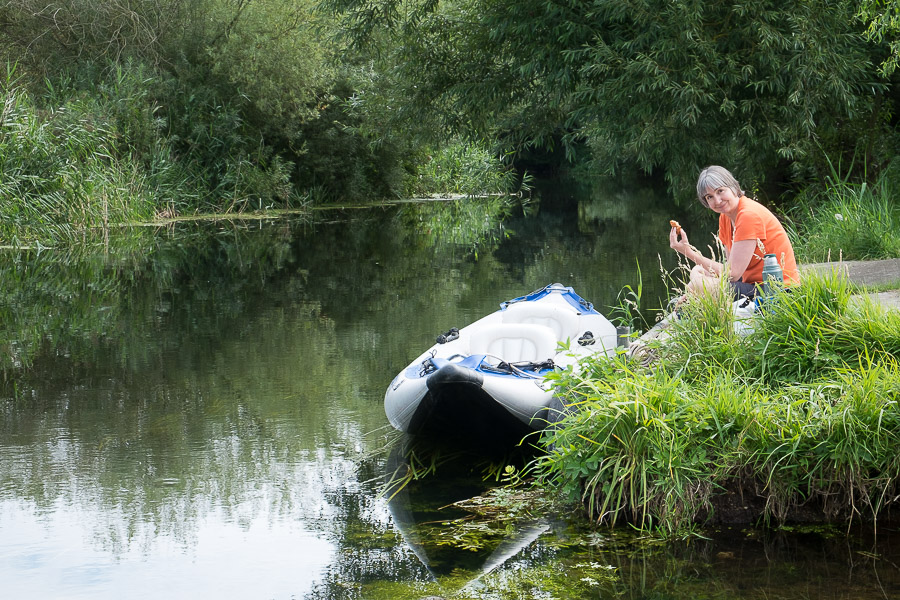Lend me your ears
Most of my ‘reading’ these days is in audiobook form. I have more time, and I’m more alert, when I’m driving or walking the dog than when I’m sleepily in bed after a long day and a glass or two of wine (though I do read in bed as well). I’ve written before about this — have a look at this post for some recommendations. The main advantage of listening over reading, of course, is that you can do it while leaving your eyes free for other tasks.
Listening to a book is different from reading it, of course – better in some ways, inferior in others – but some people also feel it’s cheating. Melissa Dahl, writing in New York magazine, suggests it isn’t.
Excerpt:
Researchers have studied the question of comprehension for decades, and “what you find is very high correlations of reading comprehension and listening comprehension,†Willingham said. As science writer Olga Khazan noted in 2011, a “1985 study found listening comprehension correlated strongly with reading comprehension — suggesting that those who read books well would listen to them well. In a 1977 study, college students who listened to a short story were able to summarize it with equal accuracy as those who read it.†Listeners and readers retain about equal understanding of the passages they’ve consumed, in other words.
Decoding, by contrast, is specific to reading, Willingham said; this is indeed one more step your mind has to take when reading a print book as compared to listening to the audiobook version. But by about late elementary school, decoding becomes so second-nature that it isn’t any additional “work†for your brain. It happens automatically.
According to the simple model of reading, then, you really can’t consider listening to a book to be easier than reading it.
For the record, though, I’d like people to know that I always listen to unabridged versions…
Thought for the day: talking to aliens
More great stuff from Neil deGrasse Tyson. Lots of good stuff in this collection of clips, but I like the 6-min section beginning at 9:53…
Freedom
Simply messing about…
Believe me, my young friend, there is nothing – absolutely nothing – half so much worth doing as simply messing about in boats.
Actually, I would recommend messing about in boats at breakfast time with a flask of freshly-brewed coffee and a bag of freshly-baked croissants.
Lovely clear water this morning on the Little Ouse between Brandon and Thetford.
The neighbours seemed friendly:
And even the Ship’s Dog had a good time.
Many thanks to CanoeDaysOut for suggesting the location.
Tips for using a private Docker registry
This is a geeky post for those Googling for relevant phrases. Sometimes a Docker Registry is referred to as a ‘Docker repository’; technically, they’re different things, but the terms are often used interchangeably.
It can be useful to have a private Docker repository for sharing images within your organisation, and from which to deploy the definitive versions of your containers to production.
At Telemarq, we do this by running:
- a standard registry:2 container on one of our DigitalOcean servers
- an nginx container in front of it, with basic HTTP auth enabled
- a letsencrypt system to provide HTTPS certificates for nginx, so the communications are secure.
The registry container can, itself, handle both authentication and the certificates, but it’s easier for us to deploy it this way as part of our standard infrastructure. It all works very nicely, and we’re just starting to incorporate it into some of our more serious workflows.
So how do you make sure that the right images end up in your repository?
One practice we adopt for any deployment system, with or without Docker, is to require that things pushed to the servers should come directly from the git repository, so that they aren’t influenced by what just happens to be in the directory on some arbitrary machine at some time. Typically we might have a script that creates a temporary directory, checks out a known version of the code, builds and deploys it to the server, and then tidies up after itself. (If you use a continuous delivery system, this may happen automatically on a regular basis.)
In the Docker world, you can take advantage of the fact that the docker command itself understands git repositories. So you can build a container from the current master branch of your github project using something like:
docker build -t myproject git@github.com:quentinsf/myproject.git
and docker will do the necessary bits behind the scenes, assuming there’s a Dockerfile in the source. (More details here).
So, suppose you want to build version 1.6 of ‘myapp’ and upload it, appropriately tagged, to your Docker registry, you can do so with a couple of simple commands:
docker build -t dockerregistry.example.com/myapp:1.6 \
gitrepository.example.com/myapp.git#1.6
docker push dockerregistry.example.com/myapp:1.6
I can run this on my Mac, a Windows machine, or any Linux box, and get a consistent result. Very nice. You could also tag it with the SHA1 fingerprint of the git commit, if wanted.
Listing the containers on your Docker registry
At present, there isn’t a convenient command-line interface for examining what’s actually stored on your registry. If I’m wondering whether one of my colleagues has already created and uploaded a container for one of our services, how would I know? There is, however, an HTTP API which will return the information as JSON, and you can then use the excellent jq utility to extract the bits you need:
curl -s -u user:password https://dockerregistry.example.com/v2/_catalog | jq .repositories[]
If you want to see the version tags available for mycontainer, you can use:
curl -s -u user:password https://dockerregistry.example.com/v2/mycontainer/tags/list | jq .tags[]
And you can of course wrap these in scripts or shell aliases if you use them often.
Hope that’s useful for someone!
It’s good to know somebody’s thinking about this…
When 140 characters would be considered a luxury
My cousin found this among my late aunt’s effects recently… it’s the telegram she received in Sussex from the small town in Kenya where I was born. Phone calls were, of course, basically impossible.

How communications have changed in one lifetime!
My next electric vehicle?
I missed this when it came out nearly a year ago…
More information on their Indiegogo page and at Modobag.com.
Hillary Blofeld?
Wow! I thought Hillary Clinton was just an American politician. But according to Donald Trump last night, she’s some kind of global potentate: a villain that would be rejected by Bond film producers as far too implausible:
After four years of Hillary Clinton, what do we have?
ISIS has spread across the region, and the world.
Libya is in ruins, and our Ambassador and his staff were left helpless to die at the hands of savage killers.
Iraq is in chaos.
Iran is on the path to nuclear weapons.
Syria is engulfed in a civil war and a refugee crisis that now threatens the West.
After fifteen years of wars in the Middle East, after trillions of dollars spent and thousands of lives lost, the situation is worse than it has ever been before.
This is the legacy of Hillary Clinton: death, destruction, terrorism and weakness.
What’s really shocking is that, on top of doing all that, she also used the wrong SMTP server!
You don’t need just one Mount Olympus
The London 2012 Olympics was, in my opinion, the biggest waste of taxpayers’ money to have occurred in my lifetime. For the amount it cost, we could have employed 500 teachers for nearly 1000 years. I’m not saying that the games shouldn’t have happened — there seem to be lots of people who enjoy watching other people jump into piles of sand — I simply think that it should have been funded entirely from the ticket prices and TV advertising.
It is, of course, entirely predictable — the Olympics is a financial disaster for almost every country that hosts it — but it’s less of a disaster for countries like the UK who have enough cash that they can take it in their stride. But when countries like Brazil, who have much more trouble funding their health services than we do, take it on, it probably moves from being stupid to being downright immoral.
So Paul Christesen’s article, Making the case for a new Olympic model, makes a lot of sense to me, and should not only dramatically cut costs, but should also reduce the large number of (essentially abandoned) stadia — I’ve visited quite a few of them — still standing around the world as monuments to the folly of politicians past. Actually, follies is a good word for them! Understandable follies, perhaps — Panem et circenses and all that, if you’ll excuse my mixing of classical references — but follies nonetheless.
It would be good for the Olympics to continue to exist, but for heaven’s sake, let’s do it in a way that makes sense in the modern world.
Free speech

From xkcd
© Copyright Quentin Stafford-Fraser







Recent Comments